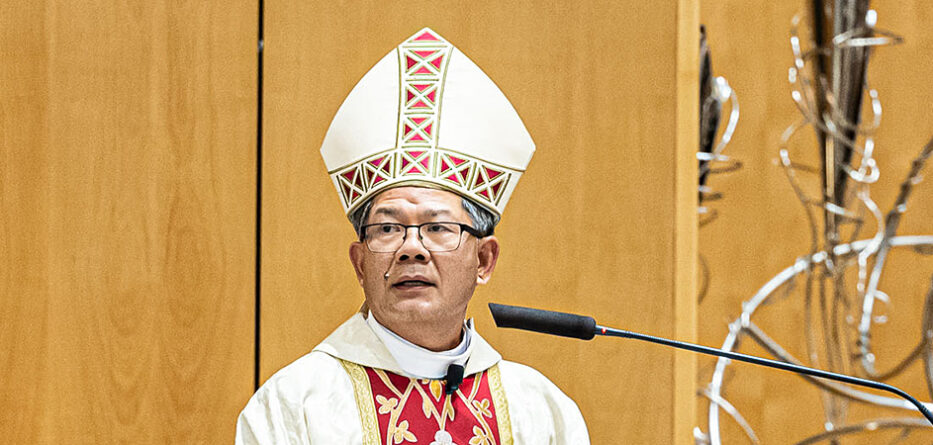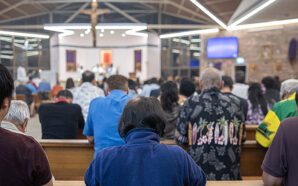Most Reverend Vincent Long Van Nguyen OFM Conv DD STL, Bishop of Parramatta
Homily for the Third Sunday of Easter, Year B
Readings: Acts 3:13-15, 17-19; Psalm 4:2, 4, 7, 9; 1 John 2:1-5; Luke 24:35-48
14 April 2024
Becoming the witnesses of hope despite despair and indifference
Dear sisters and brothers,
We may not be pessimists. But everywhere we look, there seems to be so much that is not right in the world and in our own society. The people of Ukraine have endured more than two years of unprovoked invasion and attack by one of the most powerful military forces. The Palestinians in Gaza have been caught in the war between Israel and Hamas. It has caused so much death, injury and destruction. At home, we hear too often the tragic stories of the victims of domestic violence, the youth crime crisis in Central Australia and just yesterday, the senseless killings at a suburban shopping centre.
Even as the followers of Jesus, it is easy for us to feel fatigued and defeated in the face of these overwhelming, protracted and seemingly unsurmountable challenges. We are tempted to give up the good fight and retreat to our comfort zones.
The Word of God this Sunday teaches us that evil in its many manifestations do not have the last word. We are inspired by the early Christian community who was galvanised by the suffering, death and resurrection of Jesus. The Church became a refuge for the poor and an oasis for the oppressed. We are their heirs and we too are emboldened to be the witnesses of hope in the face of despair and indifference.
In the first reading, Peter shows himself to be a person who is worthy of being the rock of faith. He has converted from his obsession with worldly power and embraced the path of the humble Suffering Servant. The encounter with the risen Lord who reinforced the lesson of suffering and vulnerability has transformed him. Thus, instead of relishing the public admiration and basking in the limelight after he has healed the cripple, Peter points to Christ as the embodiment of the God of their ancestors. Peter proclaims that the path of humiliation, rejection and death was part of the process of accomplishing the divine plan for the world. For this was the same path upon which God has led their ancestors from bondage to liberation.
The Gospel speaks about transformation in terms of having our sense of value and outlook on life changed according to God’s vision. The disciples were transformed into positive people and agents for change, not because their circumstances changed but because they began to appreciate the Christian paradox: that life is lived fully and fruitfully not by surrendering it to self-survival instincts but by giving it away for the sake of others.
This is why all the evangelists insist on the risen Jesus who had suffered and died. In today’s episode, Jesus shows his disciples his hands and feet. In other words, God has not raised up just anyone; God has raised up the one who was crucified, who had his hands and feet nailed to the cross.
Jesus’ resurrection is, then, the resurrection of a victim. God vindicates and redresses one who was a victim of injustice. God is revealed not merely as having power over death. God is revealed to us also in the triumph of God’s justice over injustice, of love over hatred and goodness over violence.
In the resurrection, God has the last word. And it is a word of lifegiving love toward the victims. Those who suffer know that their suffering will end in resurrection. This is why in the Magnificat, Mary sings the song of God’s definitive vindication of all the victims of war, persecution, injustice and indignity. She sings of the lowly raised, but the mighty cast down, the hungry fed but the rich empty-handed. The Church as a new community formed through identification with the crucified and risen Christ, is dedicated to both the victim whom God has vindicated by resurrection and to new life that overcomes hatred, violence and conflict.
My dear friends,
The disciples were tranformed after their encounter with the risen Jesus. They were able to see beyond their broken dreams and shattered hopes. They began to see life beyond their limited horizons. This is the Good News for us too. The same Jesus who appeared and reassured them comes to us in the Eucharist. The same Jesus who challenged them to be the witnesses of resurrection hope also challenges us to be his living body for the world today.
There are many victims who suffer today, maltreated by life or unjustly crucified. The Christian knows that God is in that suffering. The Christian also knows God’s last word. That’s why our commitment is clear. We must continue to be on the side of those whom the Crucified and Risen Lord identifies with. We must continue to defend the victims, to struggle against all power that kills and dehumanises; and finally to hope for the final victory of God’s justice.
Let us the people who are on the side of those deprived of the basics of life, justice, human dignity. Let us not be daunted by the evil that manifests itself in the world because the power of God as St Paul reassures us works in our weakness. Let plant and water the seeds of hope trusting that God will bring about an abundant harvest in the fullness of time.








